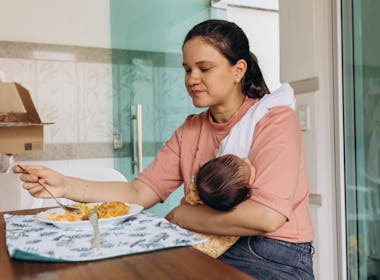“You can’t have PCOS,” a friend with PCOS told me. “You’re too skinny! You don’t have acne! You don’t have facial hair!”
It was true; I didn’t look like your typical woman with polycystic ovary syndrome, aka PCOS. But, just like you can’t judge a book by its cover, you can’t judge a woman’s hormonal health by her appearance.
Despite my friend’s protestations, I did receive a PCOS diagnosis. My fertility charts and bloodwork all showed hallmark PCOS symptoms, like long cycles and blood sugar irregularities. As it turns out, I am an example of “lean PCOS.”
Insulin resistance, PCOS, and weight gain
PCOS affects 5 to 10% of American women, so it’s no surprise that it comes in all shapes and sizes. In addition to making it difficult for some women to maintain a healthy weight, PCOS symptoms can include cysts on the ovaries, long and/or irregular cycles, chronic fatigue, hair loss or growth, and infertility, as well as type 2 diabetes and/or insulin resistance.
As Physician’s Assistant Allison Jung previously wrote for Natural Womanhood in her article “Insulin Resistance, PCOS, and Fertility Health:”
“Insulin resistance occurs when our cells become less sensitive to the actions of insulin. This results in an increase in concentration of insulin, fat, and sugar in the blood. Not only does this increase blood sugar (leading to diabetes) but it also increases cholesterol. The lack of proper glucose utilization results in fatigue and abdominal fat production. In addition, the high insulin levels result in cravings and overeating, further leading to weight gain. For women, these imbalances, if unaddressed, can be extremely harmful to her fertility.”
For many women with PCOS, this is a vicious cycle: Insulin resistance causes them to gain weight, which worsens their PCOS symptoms. Likewise, being overweight can be associated with worse insulin resistance.
Lean PCOS
While an estimated 80% of women with PCOS have a body mass index (BMI) above normal, a smaller number of women with PCOS have a normal or low BMI. Like women with typical PCOS, many women with lean PCOS experience blood sugar irregularities (like insulin resistance) at about the same rate as women with high BMIs. In lean PCOS, however, the symptoms of insulin resistance may be less severe, which can make it harder to recognize and diagnose.
In other words, while insulin resistance can certainly contribute to obesity in women with PCOS, it doesn’t always result in being overweight. Women with this form of “lean PCOS” also typically have the same symptoms and hormonal irregularities as overweight women with PCOS, but they may experience them to different degrees.
My blood sugar dysregulation comes in the form of something called hypoglycemia. In hypoglycemia, one’s blood sugar levels are lower than normal, which can lead to symptoms like an irregular or fast heartbeat, fatigue, anxiety, and hunger.
I have known that I am hypoglycemic since I was 15 years old—but no one ever connected my blood sugar problems with my irregular cycles until I saw a Natural Procreative Technology (NaPro) OB/GYN. She was going through the diagnostic procedure for PCOS with me, and mentioned wanting to test my blood sugar. When I said that I was hypoglycemic (which I should have mentioned when giving my medical history!), she said the condition could be further evidence that I might have PCOS.
The impact on diagnosis and treatment
Why does it matter whether a woman has lean PCOS or more typical PCOS? For one thing, women with lean PCOS may not be diagnosed as early as obese women with PCOS, since they don’t look like the typical PCOS patient. In fact, it may not be until these women experience fertility problems that a doctor starts looking into the possibility of PCOS. Women with lean PCOS may experience a delay in a diabetes diagnosis for the same reason, and have an estimated 3% to 10% incidence of undiagnosed diabetes.
While losing weight is usually a first-line recommendation for women with PCOS who are overweight or obese, a woman with lean PCOS is by definition a healthy weight. However, nutrition is a common area targeted for treating all forms of PCOS. For the last three years, I have been using an anti-inflammatory diet of no dairy, no gluten, and little to no processed sugar to help manage my PCOS. Even when weight loss isn’t warranted, it’s important not to forget good nutrition as an important element of treatment for women with lean PCOS. Women with lean PCOS may also benefit from similar medical options used to treat typical PCOS, such as bioidentical progesterone and/or surgery.
Many providers (and patients) have an image of what a woman with PCOS looks like. It’s important to recognize that each woman is unique, and each woman with PCOS is unique. It’s a complex disease that we still don’t know enough about. By understanding the nuances in how hormonal imbalances affect women in different ways, we can start to diagnose and treat women with PCOS more effectively and holistically.
Additional Reading:
PCOS and Diet: Can Intermittent Fasting Help Improve Fertility?
Coming off the Pill: Taryn’s Story
Understanding the Surgical Techniques Used to Address PCOS
What Are the Symptoms of PCOS, and How Do You Treat It?
The Surprising Connections Between PCOS, Dysbiosis, and Gut Health
How I started healing my painful, irregular periods with the switch to fertility awareness
Insulin Resistance, PCOS, and Fertility Health: Are you at risk?







